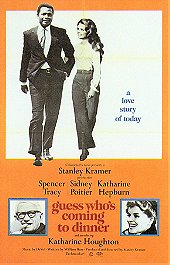Guess Who’s Coming to Dinner is a little heavy-handed, slightly clumsy in its dealings with racial issues and family strife, but it comes complete with wonderful performances. But shouldn’t that be expected from any movie starring Sidney Poitier, Katharine Hepburn or Spencer Tracy? They’re classics, legends of the screen for a reason.
The story deals with the affluent white daughter bringing home the man she found herself in a whirlwind romance with, a successful, dignified and highly intelligent older man. A man who just so happens to be black and this will bring up ever complicated and contradictory emotion that each of their parents has about the issue. Both have a mother who supports the union and both have a father who doesn’t support or understand their choice of partner. I would have preferred for some difference between the races. We get numerous scenes of Hepburn talking to Tracy about the lessons they have imparted on their daughter, she constantly reminds him that he taught her to think racism as horrendously idiotic and vile thing. Wouldn’t it have been more interesting of her mother, or both of her parents, had had more reservations about the union. Or even brought up subtly hidden racism, and with a black housemaid who’s worked for them for decades, it seems like there just might be. It is not the fault of any of the actors, this is a fault with the writing which seeks too much literary symmetry when asymmetry or even a lack of symmetry would have proven more intriguing.
The film also touches, however slightly, on interior racism. With the black housemaid raising all sorts of accusations and condemnations, all of which are unfounded, against Poitier. He takes each of her verbal lashings, she is from an older generation and believes that things shouldn’t be rocked and forced as much as they are. He is from the newer generation who seeks equality, not because of his history or his race, but because he is a hardworking individual who deserves to be treated equally. This dynamic extends outwards towards his relationship with his father in which he explains that his father thinks of himself as a black man, and he thinks of himself as a man. And that is all the difference in the world. The way that Sidney Poitier plays these two crucial scenes is the kind of subtle and meticulous acting that the Oscars were invented to celebrate, nominate and honor.
Katharine Hepburn won the Academy Award for this performance, but I cannot say that it screams out as a winning performance. She is as intelligent, luminous and graceful as ever. She delivers a great performance, but I wouldn’t rank it above Anne Bancroft or Faye Dunaway’s sublime and iconic turns as Mrs. Robinson and Bonnie Parker. Spencer Tracy is as solid and morally right as ever. He excelled in portraying men who have a specific moral compass, get it tested, question their beliefs and come out as the authoritative voice on the issue (see Judgment at Nuremberg). Katharine Houghton, Hepburn’s niece and younger look-alike, isn’t bad, she’s quite good. But she’s out of her acting league working opposite such towering screen icons. Cecil Kellaway and Beah Richards deliver my two favorite supporting performances as a family-friend who just so happens to be a priest and Poitier’s mother, respectively. They were both Oscar nominated.
While nowhere near a bad film, I wouldn’t rank it as a masterpiece. It’s very good, but slightly flawed. It deserves respect for treating such a sensitive and fresh subject, interracial marriage was just about to be made legal in all the states, with maturity, intelligence and warmth. It preaches too easily, and makes easy answers where complicated ones would have really been better suited for the material, but it tries its best. From here you can see the 1970s revolution of cinema creeping in around the edges. This is where the studio system and the independent, artistic streak merge.
 Login
Login